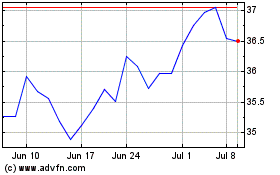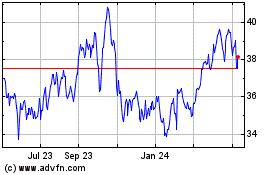Egypt Presses Oil Companies for More Time to Pay for Fuel -- Update
October 13 2016 - 3:21PM
Dow Jones News
By Sarah McFarlane and Summer Said
Egypt is pushing big energy companies to give it a break on
payments for fuel shipments after Saudi Arabia's sudden decision in
October to halt artificially cheap petroleum deliveries tightened
an economic squeeze in the North African nation.
Egypt, one of the biggest global importers of commodities
ranging from wheat to diesel fuel, is struggling to pay oil
companies ahead of trying to make the world's largest-ever
short-term deal for liquefied-natural gas.
At a meeting in Cairo on Wednesday, Egypt asked energy suppliers
to give the country six months instead of three months to come up
with the money for already-ordered deliveries of LNG, crude oil and
petroleum products, an Egyptian government official said.
The official didn't specify which companies were at the meeting.
Egypt's biggest energy suppliers include BP PLC, Vitol Group and
Trafigura Group, among others. Vitol and Trafigura declined to
comment. BP didn't immediately respond to a request for
comment.
The request underlines the deteriorating economic conditions in
Egypt during a period of political unrest and terrorist attacks
that have continued unabated since the Arab Spring uprising in
2011.
Egypt's net foreign reserves stood at less than $20 billion at
the end of September, down from roughly $36 billion before the 2011
uprising, according to Central Bank data.
The country is seeking as much as $6 billion from bilateral
creditors to meet the conditions for the International Monetary
Fund to consider a $12 billion loan aimed at plugging its
national-budget deficit and supporting its battered currency.
Egypt is pressing oil companies for more time to pay after
Egyptian officials said Saudi Arabia reneged on a five-year
contract agreed in April to supply Egypt with over $20 billion of
oil products.
Saudi Arabia, the world's top crude-oil exporter, and other
Persian Gulf states have pumped billions of dollars into Egypt's
economy since the toppling of President Mohammed Morsi in 2013.
Saudi Arabian Oil Co., known as Saudi Aramco, didn't give a
reason for why it was halting its product supplies to the country
as of Oct. 1, an Egyptian Ministry of Petroleum spokesman said. The
spokesman said Egypt plans to allocate more than $500 million to
purchase petroleum products and will launch tenders to fill the gap
in the local market.
Egypt has become a net energy importer in recent years because
of declining oil and gas production and growing demand. The country
launched its first liquefied natural gas import terminal in 2015,
adding a second terminal within months, quickly becoming the
largest importer of LNG in the Middle East. A third terminal is
planned for next year.
Egypt, along with other new importers including Pakistan and
Jordan, have benefited from entering the LNG market at a time that
prices have plummeted because new projects have boosted global
supplies.
"Electricity demand grew in excess of 5% last year, facilitated
by the availability of LNG," said Lucas Schmitt, LNG analyst at
Wood Mackenzie.
Egypt hasn't yet procured LNG to meet its needs in 2017 and is
expected to seek offers to deliver 120 cargoes, the largest-ever
short-term tender, traders said. At today's prices those deliveries
would be valued over $2 billion. It isn't clear how long Egypt will
want to pay for those cargoes.
"Some [companies] will be willing to accept the credit risk, but
this could also come at a premium for Egypt compared to other
importers in the region," Mr. Schmitt said.
Write to Sarah McFarlane at sarah.mcfarlane@wsj.com and Summer
Said at summer.said@wsj.com
(END) Dow Jones Newswires
October 13, 2016 15:06 ET (19:06 GMT)
Copyright (c) 2016 Dow Jones & Company, Inc.
BP (NYSE:BP)
Historical Stock Chart
From Mar 2024 to Apr 2024

BP (NYSE:BP)
Historical Stock Chart
From Apr 2023 to Apr 2024
